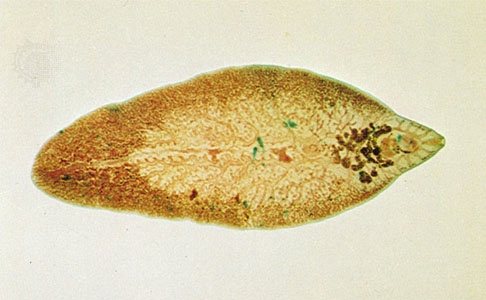fascioliasis
pathology
infection of humans and grass-grazing animals, caused by the liver fluke Fasciola hepatica, a small parasitic flatworm that lives in the bile ducts and causes a condition known as liver rot.
 F. hepatica is a leaf-shaped worm about 2 to 4 cm (0.8 to 1.6 inches) long that grows in the liver of various animals, especially cattle and sheep. The eggs pass through the bile duct and are excreted in the feces. If the eggs get into pools of water, they hatch after a few weeks, and the larvae must find their way into a small water snail. There, in the course of about two months, they multiply and emerge as free-swimming larvae. These finally attach themselves as cysts to grass or leaves of plants growing in the water. The cysts resist drying when the water recedes, and, if they are later swallowed with the grass or plants, they hatch in the host's intestine, migrate across the abdominal cavity, pierce the liver, and settle in the bile ducts, where they cause obstruction to the flow of bile and inflammation in surrounding liver tissue.
F. hepatica is a leaf-shaped worm about 2 to 4 cm (0.8 to 1.6 inches) long that grows in the liver of various animals, especially cattle and sheep. The eggs pass through the bile duct and are excreted in the feces. If the eggs get into pools of water, they hatch after a few weeks, and the larvae must find their way into a small water snail. There, in the course of about two months, they multiply and emerge as free-swimming larvae. These finally attach themselves as cysts to grass or leaves of plants growing in the water. The cysts resist drying when the water recedes, and, if they are later swallowed with the grass or plants, they hatch in the host's intestine, migrate across the abdominal cavity, pierce the liver, and settle in the bile ducts, where they cause obstruction to the flow of bile and inflammation in surrounding liver tissue.As a disease of cattle and sheep, fascioliasis has serious economic consequences. Humans can be infected by eating wild watercress. The cysts hatch in the person's intestine and migrate to the liver and other organs. These migrating larvae may cause unexpected complications; they have been found, for example, in the tissues of the larynx. The symptoms of fascioliasis in humans are fever, sweating, loss of weight, abdominal pain, anemia, and sometimes a fleeting rash. In the blood there is an increase in white blood cells of the type called eosinophils, a common finding in worm infections. Effective chemotherapeutic agents are available for treatment.
- spinach
- spinal cord
- spinalis muscle
- spinal nerve
- spine, curvature of the
- spinel
- Spinello Aretino
- spinet
- Spinks, Leon
- Spinks, Michael
- spinneret
- spinning
- spinning wheel
- Spinola, Ambrogio di Filippo, Marqués De Los Balbases
- Spinola Family
- Spinoza, Benedict de
- spin-statistics theorem
- spiny eel
- spiny-finned fish
- spiny-headed worm
- spiny shark
- spiny-tailed lizard
- spiracle
- spiral
- spirant